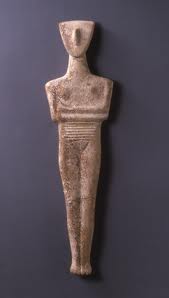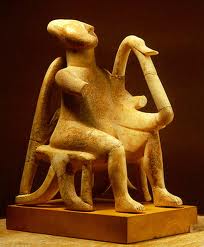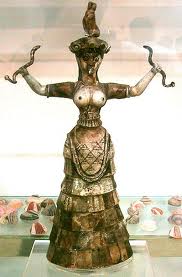Cards In This Set
| Front | Back |
|
Cycladic Culture
|
Cycladic Culture, c. 2700-2300 BCE
|
|
Minoan Culture
|
Minoan Culture, c. 2000 - 1375 BCE - Crete is the center
a sea faring culture, traders but also had a lot of agriculture on the land. It was a stratified society so many social levels. Had two kinds of writing Minoan Culture received name after King Minos |
|
Mycenaean Culture
|
Mycenaean Culture, c. 1600 - 1200 BCE
|
|
Minataur
|
- mythological half man-half bull
|
|
Labyrinth
|
- a maze
|
|
Fresco
|
- technique of wall painting on wet plaster
|
|
Tholos
|
- round temple or tomb
|
|
Cyclopean masonry
|
- walls built of very large stones
|
 What is this? |
Figure of woman, Cycladic culture, c. 2500-2300 BCE (figure 2-20
No system of writing most objects found in a funerary context commonly called Cycladic Figure Shape that pops up is a triangle, pared down to very basic elements, relies on geometry which is one of the basic Greek thoughts Made from marble Found in Crete, on the mainland, indicating that they traveled Cycladic figures tend to be female carved in the round so they don't stand up on their own |
 What is this? |
Seated Harp Player, ca 2700-2500 BCE
musicians depicted always as men made from triangles and right angles This guy has more of a fleshiness and roundness to his body that the Woman Cycladic Figure did not Marble |
|
What is this?
|
He Palace of Knossos, ca. 1700-1400 BCE discovered by Sir Arthur Evans (who penned the name Minoan Culture). He bought the entire palace complex and spent the rest of his life excavating it.
domesticated bees and brought in pomegranates from the mid-east. Homer recorded that they had 90 cities which seems like a lot. Based on where the palace was found decided that there were eight regions the island was divided into |
|
What is this?
|
Columns are all made of wood and painted. They are called inverted columns -- thicker at the top and thinner at the bottem. Makes it look shorter and probably not the best design to hold up your building
|
|
Is this an example of cyclonic masonry?
|
No - Masonry -- not built out of collosal stones but smaller stones covered with a lime concrete.
|
|
What culture had marine depictions prevalent?
|
Minoan Culture - dolphins at Knossos Palace
|
 What is this? |
Snake Goddess from Knossos, c. 1600 BCE
They think that the dieties and priestesses were all female typical Minoan dress -- breasts exposed, wasp waist, large opened eyes, holding a snake in each hand and has a cat on her head made from the glass like William the Hippo |



